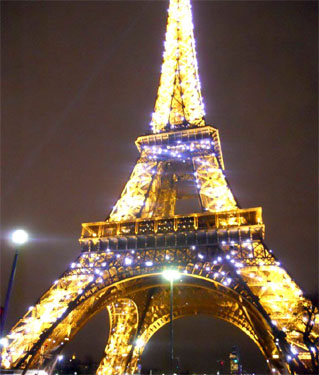

By Sarah Herrin
Thursday Review Contributing Writer
Valentine’s Day, February 14, 2013, marked one year since I arrived in Paris with about 60 college classmates and a handful of professors. A mesh of artists from various majors—sequential art, photography, graphic design, and others—we were immediately captured by the elegant and breathtaking City of Light and Love. In the fifth arrondisement, the formidable figure of Notre Dame greeted us every morning. We visited the famous museums, networked with small gallery owners, and indulged ourselves on the incredible cuisine. Exploring the underground metro, we found Le Tour Eiffel at twilight and devoured crepes au chocolat as it sparkled gold in the lavender sky. We were only in Paris for a week, but its beauty changed our lives forever. Now a full-fledged Francophile, I saw the uncorrected proof of Patricia Engel’s It’s Not Love, It’s Just Paris and snatched it up in hopes that I could relive a slice of my own Paris. Engel not only gave me that chance, but her own beautiful tale of that same nervous excitement and wide-eyed wonderment that I felt in the overwhelmingly elegant City of Light.
It’s Not Love is not primarily a love story despite the title, otherwise I never would have read it. What drew me into the story was Engel’s clear, sometimes matter-of-fact voice. Her style of storytelling made me feel as if I was reading a memoir, not an over-exaggerated romance novel. The characters are realistic, not idealistic, and reflect the imperfect actions one would actually take in certain situations. Women often go back to men who mistreat them; boys usually do not chase after the girl when she walks away as a test of devotion. People attach themselves to friends where they can find them, when it is convenient for both parties, and often overlook the one that has been waiting patiently all along.
Lita del Cielo is the first generation American daughter of two Columbian immigrants, the younger sister of one overprotective brother, and the only pacifier for a mentally unstable younger brother. Despite holding dear her heritage and culture, she abandons them all for a year abroad in the rich girls-only boarding house known as The House of Stars. The looming, old building resides in the fifth arrondisement near Notre Dame and is under the care of the opulent, ancient, bed-ridden Comtesse Seraphine. Seraphine is demanding; a woman of taste, trivial courtesies, and full of airy advice. She becomes the surrogate mother for each of the handful of young women that had come to Paris to further their careers, get a taste of independence, and search for the affections of French boys. Lita is an outcast among them in ethnicity, nationality, and even in her personal brand of femininity. She wears combat boots instead of delicate heals and wears her clothes and hair without much thought or style. She does not bother to seek the attention of boys or try to entertain them. She has a lot to learn about manipulating fate to get what she wants and the other girls are all too willing to teach her, but first, she must decide exactly what it is that she wants. Family? Culture? A sense of belonging and, ultimately, love?
In the House of Stars, Lita explores not only her immediate surroundings, but her past, her roots, and the hardship her parents experienced so that she might live in America, the land of opportunity for all immigrants. She struggles with the sense of obligation she feels for her Colombian family and their expectations of her to return to the States and work in their successful food business. She grapples with the budding and impossible love between her and a gravely sick French boy nicknamed Cato, the son of a right-wing politician who has friends in high places and enemies in low ones. This story is not only for those who have been to Paris, but also for those who have ever felt like outcasts and hoped for a haven. The writing is honest, the characters real, and the ending not-so-predictable. For anyone who has ever been to Paris or has ever suffered in love, It’s Not Love, It’s Just Paris is about finding a home away from home, finding yourself, and finding amongst all the distractions of obligation where your true passions reside.